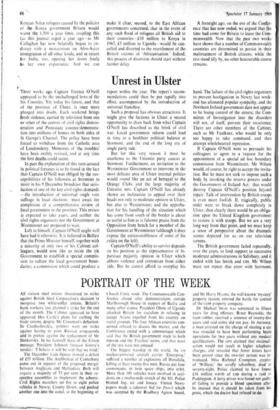Unrest in Ulster
Three weeks ago Captain Terence O'Neill appeared to be the unchallenged hero of the Six Counties. Yet today his future, and that of the province of Ulster, is once more plunged into doubt. Each weekend brings fresh violence, carried by television from one or other of the centres of civil rights demon- stration and Protestant counter-demonstra- tion into millions of homes on both sides of St George's Channel. The police have been forced to withdraw from the Catholic area of Londonderry. Memories of 'the troubles' have been swiftly revived, and at any time the first deaths could occur.
In part the explanation of this turn-around in political fortunes is to be found iu the fact that Captain O'Neill was obliged by the sus- ceptibilities of his followers at Stormont to insist in his 9 December broadcast that satis- faction of one of the key civil rights demands —the introduction of universal single vote suffrage in local elections - must await the completion of a comprehensive review of local government in the province. This review is expected to take years; and neither the civil rights organisers nor the Government at Westminster are prepared to wait.
Left to himself, Captain O'Neill might well have had it otherwise. It is believed in Belfast that the Prime Minister himself, together with a minority of only two of his Cabinet col- leagues, would now like to invite the Int Government to establish a special commis- sion to redraw the local government boun- daries; a commission which could produce a report within the year. The report's recom- mendations could then be put rapidly into effect, accompanied by the introduction of universal franchise.
Such a proposal has obvious attractions. It might give the factions in Ulster a second opportunity to draw back from what Captain O'Neill has described as the brink of civil war. Local government reform could lead in time to a healthier political balance at Stormont, and the end of the long era of single party rule.
But for this very reason it must be anathema to the Unionist party caucus at Stormont. Furthermore, an invitation to the Westminster Government to intervene in the most delicate area of Ulster internal politics would sound like an act of betrayal to the Orange Clubs and the large majority of Unionist hos. Captain O'Neill has already shown an inclination to appeal over their heads not only to moderate opinion in Ulster, but also to Westminster; and the approba- tion for his handling of the situation which has come from south of the border is about as useful to him as is fulsome praise from the Opposition front bench for a member of the Government at Westminster (although it does expose the unreasonableness of some of his critics on the left).
Captain O'Neill's ability to survive depends on his position as the representative of bi- partisan majority opinion in Ulster which abhors violence and extremism from either side. But he cannot afford to overplay his hand. The failure of the civil rights organisers to prevent hooliganism in Newry last week- end has alienated popular sympathy, and the Northern Ireland government dare not appear to be losing control of the streets; the Com- mittee of Investigation into the disorders will not, of itself, prevent their recurrence. There are other members of the Cabinet, such as Mr Faulkner, who would be only too happy to take command, and then attempt wholehearted repression.
If Captain O'Neill were to persuade his colleagues to agree to a 'request for the appointment of a special ad hoc boundary commission from Westminster, Mr Wilson would, of course, be right to accept the invita- tion. But he must not seek to impose such a body by invoking the reserve powers under the Government of Ireland Act : that would destroy Captain O'Neill's position beyond repair. Talk of intervention by British troops is even more foolish. If, tragically, public order were to break down completely in Ulster, then clearly there would be an obliga- tion upon the United Kingdom government to restore it with troops. But we are a very long way from that point, and we must keep a sense of perspective about the dramatic scenes depicted for us on our television screens.
The British government failed repeatedly, over the years, to lend support to successive moderate administrations in Salisbury, and it ended with lan Smith and urn. Mr Wilson must not repeat that error with Stormont.


































 Previous page
Previous page